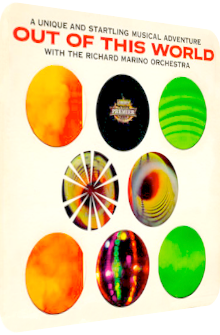
Richard Marino
Out Of This World
1961
Out Of This World is violinist and orchestra leader Richard Marino’s second installment of 1961, released on Martin Denny’s house label Liberty Records. Featuring the usual 12 compositions of well-known proportions, Out Of This World is an album whose wonderful transitions and transcendental aura are utterly unexpected if one considers Marino’s The Magic Beat!, an album which has an intriguing concept as well, but one which the arranger failed to channel and nurture. Out Of This World is delightfully different. The things that went horribly wrong on his preceding artifact The Magic Beat! are now prospering in a concentrated manner. Whereas the clownery of that album did hint at cheap circus tricks instead of being music for illusionists – a term I coincidentally coined for another Exotica gem, Mandingo’s Savage Rite (1975) –, Out Of This World is a perfect example of a well-working formula that holds the twelve pieces together. The many stars, moons and rainbows all hint at an aeriform aurora.
Admittedly, it does not take a genius to come up with an album of 12 different classics that all have certain terms and signal markers in their titles or which invoke certain cultural connotations. However, it is here where Marino includes two crucial columns, both of which augment the listening experience quite a bit: for one, there is an unmentioned soprano singer on board whose vocals tower, power and shower through the densely layered mélange of strings, vibes and flutes. The second column is based on a space organ and a good amount of sine tone-based special effects. These float and glitter through the arrangements more often than not and are simply fitting, albeit a tad gimmicky. What else Out Of This World has in store is explicated below.
There is much praise for Out Of This World in the small niche that is the Space-Age/Exotica genre, and the reason is already aptly showcased – no, unleashed – by Richard Marino’s rendition of Cole Porter’s Out Of This World. More of a takeoff than a mere take, the opening segue enchants with plinking glockenspiels, metallic-organic swooshing sounds, cavernous violins… is this an outtake off Russ Garcia’s Fantastica (1958)? Of course not. But it comes close, as Marino oscillates between soprano vocal-fueled enigmas and clarinet-accentuated shades. It is after one minute that the string-heavy protrusion sets in, resulting in mellow harp twangs, fluttering hazes of auroral heat and spacy sine tones. One crucial opener that lives up to the self-proclaimed concept.
James Van Heusen’s and Johnny Burke’s Moonlight Becomes You shuttles towards romanticism and is supercharged with nocturnal plinks, lilac flute flumes and string washes aplenty; the melody is beautiful, the atmosphere only slightly saccharified. The aggrandized strings are then accompanied by a Wurlitzer space organ, adding a short moment of a curious comic relief to the scenery that is painfully resemblant to Marino’s antic The Magic Beat!, but since the organ is delicately interwoven and only lasts for a mere ten seconds or so, it is a eupeptic fugacity in the end.
Leigh Harline’s and Ned Washington’s When You Wish Upon A Star lures listeners and Disney fans with its well-known fanfare, realized here in a commonplace manner with the help of strings and a lead clarinet. It is, however, the backdrop which ameliorates the setting, be it the soprano enchantress or the gyrating polar light scintillae which, in tandem, add a moony bliss to the already sumptuously euphonic earwig. Edgar Leslie’s and Fred E. Ahlert’s The Moon Was Yellow is next on the agenda and turns out to be a surprisingly voluminous symphonic take with many a doleful string adjuvant and murky flute. Rubicund tarantella strings evoke Hugo Winterhalter’s Goes Gypsy (1960), the vortex of dun-colored memories remains a standout track of Richard Marino’s album, its clandestine aura notwithstanding.
Much delight follows with the two remaining sparklers of side A, both of them constants in the Exotica universe, presented here in physiognomies that resemble their original gestalts: whereas Hoagy Carmichael’s and Mitchell Parish’s Stardust focuses on elasticized flute streamlets, sugary pizzicato strings and horticultural granulomas where legato violins swoosh amid blue-tinted vibraphone vesicles, Johnny Burke’s classic Misty lets the bass flute hit the spotlight as it plays the main melody with the Space-Age organ on a rotating basis. Some pentatonic interstices are sewn in, but the true power derives from the wealth of strings. I still prefer the magenta interpretation of pianists Ferrante & Teicher on their corker Pianos In Paradise (1962), but am likewise impressed by Richard Marino’s arrangement.
Side B lives up to the thematic and aesthetic premise, only breaking the spell title-wise with Max Steiner’s theme of Gone With The Wind which, as can be clearly seen, does not sport a planetary connotation. Maybe Marino refers to the solar winds, and given the downright eerie opening phase with its analogue radio waves and camouflaged string nebulae, this could well be close to the truth. Once this alienated wideness is overcome, the nucleus of the arrangement appears: the expected string washes and harp helixes are ennobled by the pristine afterglow of the space organ, and granted, one has not heard Steiner’s cinematic vision this way before. An evergreen by Frank Signorelli, Matty Malneck and Mitchell Parish is presented next: Stairway To The Stars ascends to the troposphere with an interplay of sweeping sounds and momentary pauses which brings the pulsating double bass aorta to the foreground, while Edgar “Yip” Harburg’s and Harold Arlen’s Over The Rainbow celebrates both the return of the anonymous soprano singer and its own fairy tale aura. The stardust glitters and special effects amid the fluffy flutes and magical strings lessen the sugary pompousness quite a bit.
Sergey Rachmaninov’s Full Moon And Empty Arms only tends to the bluish side of life via its title but otherwise sees Marino add his sine tone effects to a vista that is rich of harmonious overtones, simmering flutes and Wurlitzer wisps. Dorothy Fields’ and Fritz Kreisler’s Stars In My Eyes then proves to be the most eclectic fanfare with various ebullient gradients of liveliness and Waltz-like counterpoints whose majesty sounds gorgeously dreamy, with the finale Stella By Starlight by Ned Washington and Victor Young bewitching the dedicated listener with soprano airflows, thickly wadded string formations and incisive sky-high tone sequences which wobble and float through the starlit air, making this a great closure to Richard Marino’s most successful LP.
The concept of Out Of This World is flawlessly realized. This is the most exciting thing to say about Richard Marino’s orchestral opus. True, I have reviewed hundreds of Ambient and Exotica albums where this statement applies time and again, but the Marino File is a different case, so to speak. Finally, the material does the concept justice, and vice versa. In addition, there are many strings to be absorbed, an important ingredient that was amiss heretofore on The Magic Beat! which was one of the bigger disappointments in this regard. The material Marino chose for Out Of This World works so fabulously well not just because of its thematic relevance, but the density and plasticity of the arrangements, with strings, flutes and strange organs being the primary ingredients that make this selection so intriguing. The soprano vocals and occasionally eerie special effects are of even greater importance to some, for it is these aural devices that bring the stars and planetoids to life.
To be honest, Out Of This World would simply be a romantic album without their inclusion, and a damn fine one it would be, definitely spacy and prone to be nonetheless included in the Space-Age canon. But with the vocals and special (spatial?) effects, the case is crystal-clear: whether the superb overtures of Gone With The Wind and the title track Out Of This World wash over the listener or the stardust organ shuttles, plinks and clings on Moonlight Becomes You and Misty, this is an album that should better be reissued yesterday than tomorrow, but unfortunately the current rightsholders beg to differ. This is the Marino album to own and worship, a zoetrope that mixes the eldritch uncanniness of Russ Garcia with the romantic notions of Dominic Frontiere’s Love Eyes (1960).
Exotica Review 410: Richard Marino – Out Of This World (1961). Originally published on Jan. 24, 2015 at AmbientExotica.com.
